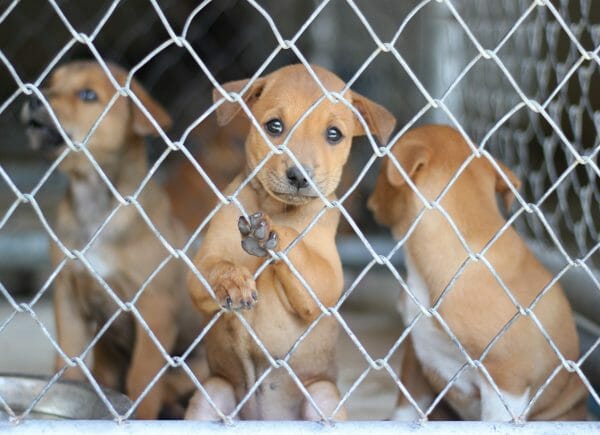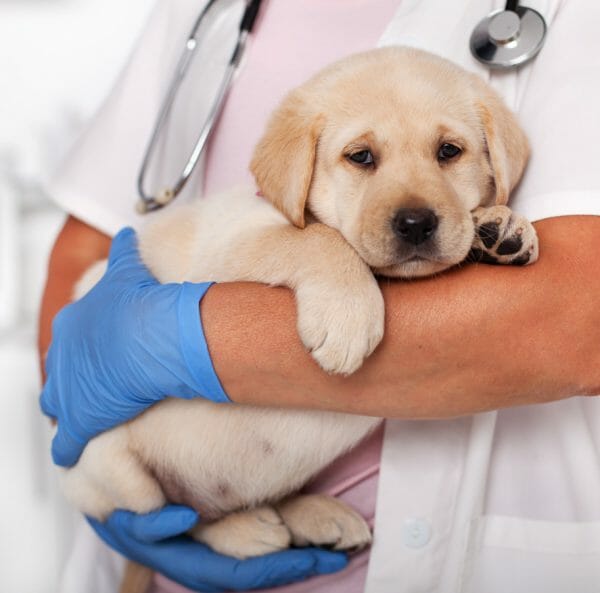What is Canine Coronavirus?
One extremely infectious disease that is known to occur strictly in dogs is the enteric canine coronavirus disease (CCoV for short). Even though dogs of any age may contract canine coronavirus, it is most prevalent among young puppies under 8 weeks old.
It is important to note that enteric canine coronavirus is not the same virus that causes COVID-19, which led to a global pandemic in 2020. COVID-19 is caused by the SARS-CoV-2 virus. Canine coronavirus does not affect humans.
Canine enteric coronavirus is a virus that manifests in parts of the small intestinal tract. It may also grow and reach areas of the lymphatic system. Dogs can also get canine respiratory coronavirus (CRCoV), which is part of the complex of viruses and bacteria that are associated with canine infectious respiratory disease or “kennel cough.”
If the canine coronavirus appears on its own without any other disease appearing alongside it, it usually lasts a short duration of a week or so and goes away without any further problems. However, this is not always the case. Because this disease can manifest in puppies as much as it can in adult dogs, the canine parvovirus is often an illness that appears concurrently with the coronavirus. If both of these viruses coexist, it can wreak havoc on a dog internally.

How Do Dogs Get Canine Coronavirus?
Canine coronavirus is normally passed on from dog to dog via exposure to feces that carry the disease. When a dog any sniffing or licking around the contaminated droppings, the dog can become infected. Whether it be on the bottom of a shoe, on flooring, or on food, the infected feces may be spread quite easily from place to place.
Crowded areas such as dog parks, pet shops, boarding kennels, or shelters are optimal locations for the canine coronavirus to grow and diffuse. Technically, whenever a dog comes into contact with a contaminated object or animal, the dog is at risk for getting it too. Additionally, areas that are dirty or unsanitary can aid in facilitating the growth of the coronavirus.
It should also be mentioned that puppies should be kept away from the aforementioned areas until they are older. During puppyhood, their immune systems can still be quite weak, which makes them especially susceptible to canine coronavirus.

Incubation Period
About 1 to 4 days usually pass between the time when the canine is exposed to the canine coronavirus and when the dog becomes symptomatic. In some cases, the pup may exhibit no symptoms at all. The overt manifestation of symptoms varies by case when it comes to this disease.
Can Cats Get It?
There are two distinct forms of the coronavirus that cats may contract. Felines often get what is known as the feline enteric coronavirus (or FECV). This condition is usually benign and often easily treatable with the right medication.
However, this virus has the possibility of turning into feline infectious peritonitis virus (FIPV), which can become life-threatening. Luckily only between 5% and 10% of cats end up with FIPV.
Cats may become infected with this virus in the same way as dogs do. However, felines are infected through exposure to saliva rather than droppings.
Is It Contagious to Humans?
The canine version of this virus cannot be transmitted to humans or vise versa. Unlike dogs, whose virus manifests in the small intestines, humans tend to develop a coronavirus in the respiratory system.

Coronavirus Symptoms in Dogs
When it comes to the symptoms associated with this disease, it can vary from canine to canine. In some dogs, the symptoms are seen in full force. Other dogs, however, may get no symptoms during the entire course of the infection.
Puppies tend to feel the brunt of the infection more than older dogs. What makes matters worse is that many of the symptoms for enteric canine coronavirus mirror the signs and symptoms of the parvovirus. Because of this, it is difficult to tell what type of virus is occurring and how serious it may be.
Besides this, there are a great many unrelated medical issues that share the same symptoms as this infection. It is highly recommended that, if the following signs are seen with relative frequency, a trip to the vet should be made promptly in order to nail down what exactly is going on with the poor pup.
Indications of Enteric Canine Coronavirus
- Acute bloody diarrhea (often orange in color and liquid in texture)
- Nausea and/or vomiting
- Extreme dehydration
- Loss of weight
- Diminished appetite
- Lethargic behavior
Young puppies tend to develop the particularly dangerous symptom of enteritis. This condition is marked by the intestines becoming very swollen and inflamed. A symptom such as this will need to be immediately treated.
Treatment of Canine Coronavirus
There is no specific treatment method for this infection currently. Fortunately, if this specific infection is the only issue occurring in the dog, it is usually an easy thing to treat. The real complications arise when this virus occurs in conjunction with addition viruses, such as the parvovirus.
In treating the virus alone, a vet will most likely focus on treating the symptoms rather than the actual virus. This is because viruses normally have to run their course before fully going away. The vet will also work to hydrate the canine intravenously as much as possible due to the intense dehydration that it often endures with this infection. In order to treat the symptoms, various antibiotics may be used alongside antiemetics and anti-diarrheal medications.
Canine Coronavirus Vaccine
 According to the professional opinion of many veterinarians and their related institutions, a vaccine for enteric canine coronavirus is neither necessary nor required. Although a vaccine for enteric canine coronavirus does exist, many vets recommend skipping it.
According to the professional opinion of many veterinarians and their related institutions, a vaccine for enteric canine coronavirus is neither necessary nor required. Although a vaccine for enteric canine coronavirus does exist, many vets recommend skipping it.
This opinion, which has proven to be rather controversial among both vets and dog owners, is supported by the following reasons:
- Young dogs that are 8 weeks old or older are rarely diagnosed with this disease.
- Enteric canine coronavirus is non-serious and may easily go away in a matter of a few days.
- Other required vaccines, such as those for parvovirus and distemper, tend to work effectively in preventing coronavirus as well.
These explanations continue to confirm and uphold the argument that a vaccine for canine coronavirus is not needed.
Side Effects Associated with Dog Vaccinations
One may argue that another valid reason that this vaccine is unnecessary is that vaccines, no matter what kind they are, carry potential side effects. Below are some of those side effects:
- Out of character behavior
- Excessive bleeding where the vaccine was given
- Anaphylaxis
- Discharge from nose
- Anemia
- Lumps around the site of the vaccination
Besides these symptoms, there always remains the possibility that the vaccine may not work at all, causing the dog to become infected. If a vaccine is not required, it is usually best to avoid it altogether. Unless, of course, the dog’s vet deems it absolutely necessary to the dog’s health.



